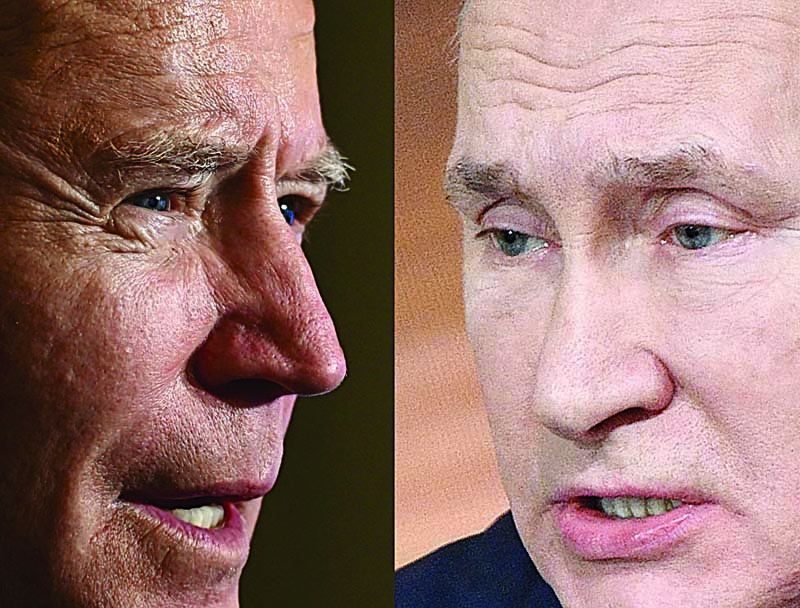 This combination of file pictures shows US -President Joe Biden (left) and Russian President Vladimir Putin. - AFP
This combination of file pictures shows US -President Joe Biden (left) and Russian President Vladimir Putin. - AFPMOSCOW: A top aide to Vladimir Putin said US-Russia relations are at an "impasse" but this week's summit with Joe Biden in Switzerland could help ease tensions. Putin and Biden are to meet at a villa in Geneva today with tensions high over a long list of disputes, from cyberattacks and election meddling to human rights violations. "Russian-US relations are now at an impasse, the situation is close to critical. Something needs to be done," Yuri Ushakov, Putin's foreign affairs adviser, told journalists ahead of the summit.
"I view this meeting with practical optimism, but not much. It is a first meeting under difficult circumstances," he said. Ushakov said the Russian and US ambassadors, who returned home this year amid tensions over sanctions, could go back to their posts immediately if the summit goes well. "It will be a tremendous achievement if the ambassadors return to work," he said. Ushakov said the two leaders would discuss cybersecurity, climate change, the Arctic and regional conflicts, among other issues.
US President Joe Biden said Monday he would lay down "red lines" to his Russian counterpart Vladimir Putin at their upcoming meeting, after rallying NATO allies to face up to challenges from Moscow and Beijing. Speaking after his first NATO summit since being elected, Biden insisted: "I'm not looking for conflict with Russia, but that we will respond if Russia continues its harmful activities."
Biden also called Putin "tough" and "a worthy adversary" ahead of their hotly anticipated meeting in Geneva today. The warning to the Kremlin leader came as Biden pressed to renew Washington's transatlantic ties with allies after years of tensions under his predecessor Donald Trump. At Biden's urging, NATO leaders agreed to work together against the "systemic challenges" posed by China's aggressive policies as the alliance fleshed out its nascent approach to Beijing.
China's increasingly assertive actions in building a nuclear arsenal as well as space and cyber warfare capabilities threatens the international order, they said in a statement. NATO Secretary General Jens Stoltenberg said the allies would seek to cooperate with China on global issues like climate change, as European capitals wanted.
But, in a nod to Washington's growing concern, he warned: "China's growing influence and international policies present challenges to Alliance security." "Leaders agreed that we need to address such challenges together as an alliance, and that we need to engage with China to defend our security interests," he said.
In the summit communique, the leaders told Russia that there would be no quick return to "business as usual". Russia's military build-up and provocative behavior on NATO's eastern frontier "increasingly threaten the security of the Euro-Atlantic area and contribute to instability along NATO borders and beyond".
Right balance
On China, Biden is picking up from where Trump left off by getting NATO to start paying attention to Beijing. But European allies have been wary that an increase of focus on China could distract NATO from its major priority -- Russia. German Chancellor Angela Merkel insisted that alliance members should not "overestimate" the dangers posed from Beijing. "We have to find the right balance," she said. "China is a rival on many issues, but at the same time it is also a partner on many issues."
French President Emmanuel Macron insisted that NATO should not spread itself too thin and "skew" the relationship with China. "NATO is a military organization, the subject of our relationship with China is not only military," he said, stressing NATO's north Atlantic focus.
Looming large in the background for the summit was also the scramble to complete NATO's hasty withdrawal from Afghanistan after Biden surprised partners by ordering US troops home by September 11. Biden discussed with Turkish President Recep Tayyip Erdogan an offer from Ankara to keep troops in the country to secure Kabul airport -- provided the US gave support. Erdogan announced no firm deal on the issue -- or any progress on the thorny dispute over Turkey's purchase of Russia's S-400 missile system. - AFP










